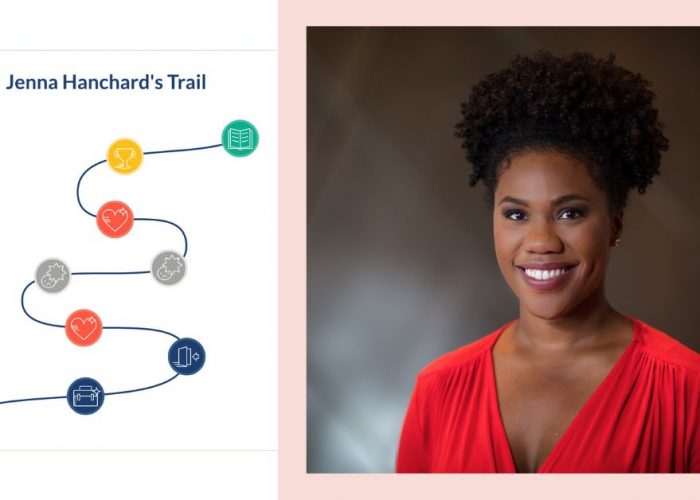Jenna Hanchard
This Trailblazers series takes a look at the pivotal milestones that make up the life trails of inspiring women from a diverse array of backgrounds and experiences. We all know what social media profiles display about the end results women have achieved. This series is intended to take a deeper, more authentic look at the journeys they have taken to get there.
Jenna Hanchard is an award-winning journalist, former news anchor and a podcast host and producer. After spending 10 years in a broadcast journalism career, living what she calls a muted version of her truth, she left the commercial news industry to start her own podcast, Lolas Ink, exploring stories of Black girl liberation. Jenna is passionate about seeking and speaking truth and centering Black voices.
After learning more about the trail that Jenna has blazed, I got the chance to ask her some questions.
Rebekah Bastian: You started out with degrees in Broadcast Journalism, History and French. Did you envision that combination of disciplines would lead you to where you are today?
Jenna Hanchard: I thought that combination was going to allow me to be a well rounded journalist. At one point I wanted to be a Black Christiane Amanpour and have my own show on NBC or CNN. When I started out in the broadcast news world, I deeply believed that if I worked hard enough and told good stories that these corporate news organizations would make a space for me. I learned that I could only be the Black version of myself; thats the version I would need to make space for.
Bastian: Despite the self-proclaimed objectivity that news organizations often pride themselves on, in your journalism career in what ways did you observe biases or skewed lenses through which stories are told?
Hanchard: I think, for the most part, you can find great journalism from independent, community-based and freelance news organizations and journalists.
What Ive observed is that American news media is not and maybe never was the fourth estate. Black and Brown voices and story ideas have been silenced in corporate news organizations because were trying to critique the same system that benefits white American journalists
Our critiques of the three branches of government do not fit nicely into the propaganda that American news media looks to sell. When Black and Brown people critique the executive, judicial and legislative branches of government we are viewed as partisan or having an agenda.
My dad, Michael Hanchard, says that democracy was never meant for everyone. Hes right. I think American journalism, populated by mostly white reporters serves to reassure the majority that the system is working on their behalf. Objectivity is a fairytale that sells.
Bastian: You led research and discussions examining Race & Parenting and you have recently become a parent yourself. What have those experiences revealed to you about the parental conversations and perspectives that exist amongst different racial identities?
Hanchard: Black and brown families have always talked about race and racism with their children. Its not a matter of importance for Black and brown families; its a requirement to survive. Its white families that must wrestle with the word importance. For many white families, discussions about race are part of a list of things they attempt to fit in within the day, possibly after bath time. Doctors, PEPS groups and parenting magazines need to say to white families: If you dont have an anti-racist household, you will raise children who will kill Black and Brown people, who will discriminate against Black and Brown people in the hiring and firing process and who will kill Black mothers on the operating table. What conversations are you having with your kids to make sure they do not grow up to be thriving members of this current white supremacist society?
Bastian: You stepped away from a successful career in an environment in which you experienced racism first hand, in order to do work to address systemic racism. What advice do you have for other womxn that are trying to find the balance between getting a seat at the table vs. building their own?
Hanchard: We all experience racism first hand. Everyone is swimming in this racist system. White folks witness and benefit from anti-Black racism and often choose to say nothing or do nothing about it. Many Black and Brown folks, unfortunately, must endure it if they want a paycheck at the end of the day.
I left broadcast journalism so that I could breathe. I left broadcast journalism so that I could love and receive love. I left broadcast journalism so that I could figure out a way to use my skills to build my own table and liberate other Black and brown womxn. I dont have any specific advice. I think one must measure how heavy their heart is at the end of the day and then ask how will I manage this weight? Maybe thats leaving a career, maybe thats getting a new hobby or a mediation practice, maybe thats building a support group. I think liberation looks different for different people.
Bastian: Ive really appreciated how you address racial topics directly and authentically in your first episodes of Lolas Ink. Now that you have your own mic, where do you see the podcast going? Who do you imagine listening and why?
Hanchard: I hope everyone will listen! Right now, Im enjoying telling stories without restrictionstalking to who I want, about what I want and how I want. Commercial news lacks historical context, nuance, and the ability to elevate consciousness. My hope is that my podcast can provide all of those things and center Black womxn. Black womxn should be listened to. Black womxn should be paid. Black womxn should be amplified.read more
Trailblazers: Jenna Hanchard, Host Producer Of Lola’s Ink


